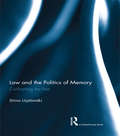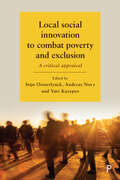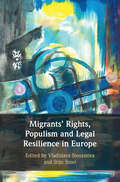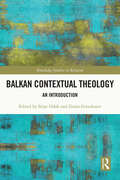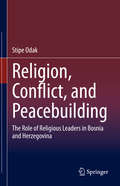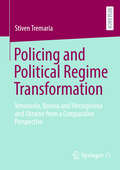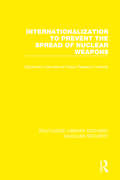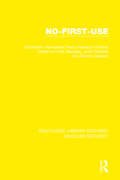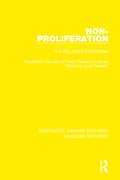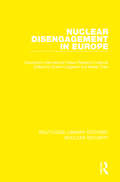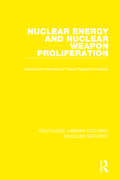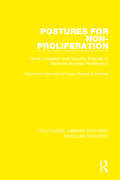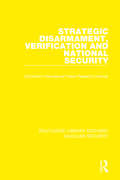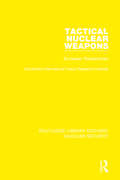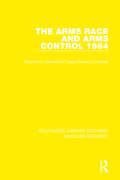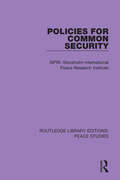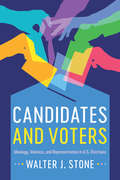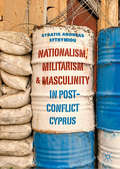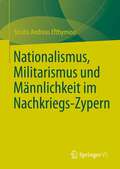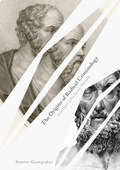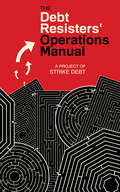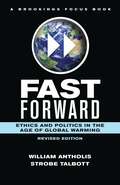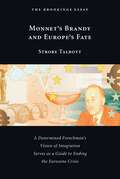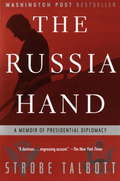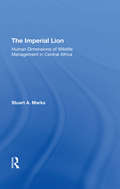- Table View
- List View
Law and the Politics of Memory: Confronting the Past
by Stiina LoytomakiLaw and the Politics of Memory: Confronting the Past examines law’s role as a tool of memory politics in the efforts of contemporary societies to work through the traumas of their past. Using the examples of French colonialism and Vichy, as well as addressing the politics of memory surrounding the Holocaust, communism and colonialism, this book provides a critical exploration of law’s role in ‘belated’ transitional justice contexts. The book examines how and why law has become so central in processes in which the past is constituted as a series of injustices that need to be rectified and can allegedly be repaired. As such, it explores different legal modalities in processes of working through the past; addressing the implications of regulating history and memory through legal categories and legislative acts, whilst exploring how trials, restitution cases, and memory laws manage to fulfil such varied expectations as clarifying truth, rendering homage to memory and reconciling societies. <P><P> Legal scholars, historians and political scientists, especially those working with transitional justice, history and memory politics in particular, will find this book a stimulating exploration of the specificity of law as an instrument and forum of the politics of memory.
Local Social Innovation to Combat Poverty and Exclusion: A Critical Appraisal
by Stijn Oosterlynck, Andreas Novy & Yuri KazepovBased on more than thirty case studies in eight different countries, this book explores the governance dynamics of local social innovations in the field of poverty reduction. The diverse team of contributors reflect on the trajectory of social innovation in European governance. They illustrate how different governance dynamics and welfare mixes enable or hinder poverty reduction strategies and analyse how they involve a diversity of actors, instruments and resources at different spatial scales. The contributions are based on research motivated by the standstill in the fight against poverty in Europe and the anxiety that conventional macro-social policies are insufficient to deal with the current challenges.
Migrants' Rights, Populism and Legal Resilience in Europe
by Vladislava Stoyanova Stijn SmetBringing together scholars of migration and constitutional law, this volume analyses the problematic relationship between the rise of populism, restrictions of migrants' rights and democratic decay in Europe. By offering both constructive and critical accounts, it creates a nuanced debate on the possibilities for and limitations of legal resilience against populist erosion of migrants' rights. Crucially, it does not merely diagnose the causes of restrictions of migrants' rights, but also proposes how the law might be used as a solution. In this volume, the law is considered as both a source of resilience and part of the problem at three distinct levels: the legal-theoretical, the European, and the national level. It is a major contribution to the literature on migrants' rights, offering a nuanced account of how legal resilience might be used to safeguard migrants' rights against further erosion in populist times. This book is available as Open Access.
Balkan Contextual Theology: An Introduction (Routledge Studies in Religion)
by Stipe OdakThis book opens a new research field in Balkan contextual theology. By embracing culturally rich traditions of the Western Balkans as its starting point, it explores their existential and theological bearings. Placed at the crossroads of civilizations and religions, this region has witnessed some of the worst atrocities of the 20th century. At the same time, it has produced unique textures of inter-cultural life. The volume addresses some of the most poignant phenomena endemic to the region, such as sevdalinka music, intimate forms of neighborhood, archetypes of ‘sacred warriors,’ the experience of democratic jet lag, collective melancholy, and intergenerational trauma. As the first book of this nature, it aims to encourage further development of contextual theological thinking in the region and promote its international reception.
Religion, Conflict, and Peacebuilding: The Role of Religious Leaders in Bosnia and Herzegovina
by Stipe OdakThis book provides fresh insights into the role of religious leaders in conflict transformation and peacebuilding. Based on a large dataset of interviews with Christian and Muslim leaders in Bosnia and Herzegovina, it offers a contextually rich analysis of the main post-conflict challenges: forgiveness, reconciliation, and tragic memories. Designed as an inductive, qualitative research, it also develops an integrative theoretical model of religiously-inspired engagement in conflict transformation. The work introduces a number of new concepts which are relevant for both theory and practice of peacebuilding, such as Residue of Forgiveness, Degree Zero of Reconciliation, Ecumene of Compassion, and Phantomic Memories. The book, furthermore, proposes two correlated concepts – “theological dissonance” and “pastoral optimization” – as theoretical tools to describe the interplay between moral ideals and practical limitations. The text is a valuable resource for religious and social scholars alike, especially those interested in topics of peace, conflict, and justice. From the methodological standpoint, it is an original and audacious attempt at bringing together theological, philosophical, and political narratives on conflicts and peace through the innovative use of the Grounded Theory approach.
Policing and Political Regime Transformation: Venezuela, Bosnia and Herzegovina and Ukraine from a Comparative Perspective
by Stiven TremariaThis book offers a comprehensive study on the dynamics of policing under contexts of political regime transformation in the interplay between democratization and de-democratization through a cross-case comparative analysis among Venezuela, Bosnia and Herzegovina and Ukraine. The central concern lies in working out the intertwining between politics and policing by examining the development trajectories of democratic police reforms under scenarios of democratic stagnation, backsliding and autocratic consolidation. In particular, this book analyzes those changes experienced by the police as an institution, their powers and the practices for policing society in the framework of the endeavors for politicization, militarization and informalization of policing. This analysis is addressed from a macro-level actor-based approach, which accounts for the decisive role of ruling political actors and senior police managers as critical players who influence the decisions and patterns of political regime transformation and policing. Therefore, this book offers a groundbreaking study of the interrelationship among contemporary processes of de-democratization and police counter-reform from an actor-based perspective.
Internationalization to Prevent the Spread of Nuclear Weapons (Routledge Library Editions: Nuclear Security)
by Stockholm International Peace Research InstituteFirst published in 1980, the original blurb read: In August – September 1980 the second Review Conference of the Non-Proliferation Treaty (NPT) will take place in Geneva. As this Treaty is the most important barrier to the proliferation of nuclear weapons, the results of the Conference will obviously have major effects in the field of arms control and disarmament. The implications of the recent International Nuclear Fuel Cycle Evaluation (INFCE) are that the technological capabilities of many countries are such that there is no technical solution to the problem of the spread of nuclear weapons to countries that do not now have them. Thus, it appears that if there is a solution at all, it must be political in nature. A possible element in such a political solution is the internationalization of the sensitive parts of the nuclear fuel cycle; that is, those parts that have the potential of producing fissile materials to make nuclear weapons. Although the intricacies of a system of internationalization are still unresolved, the concept, if realized, would provide another powerful political barrier to nuclear weapon proliferation – a reinforcement for the aims of the NPT itself. Against this background, and as a follow-up to its first symposium and the resultant book, Nuclear Energy and Nuclear Weapon Proliferation, SIPRI convened a second international group of experts to continue its discussions of issues pertinent to the forthcoming NPT Review Conference. The meeting took place at SIPRI in Stockholm, 31 October – 2 November 1979, when the feasibility of internationalizing the nuclear fuel cycle was examined. SIPRI’s views on this complex approach are expressed in Part 1 of this book - Internationalization to Prevent the Spread of Nuclear Weapons. Part 2 contains the papers that were presented at the symposium.
No-First-Use (Routledge Library Editions: Nuclear Security)
by Stockholm International Peace Research InstituteThe debate on no-first-use of nuclear weapons has been conducted on a number of fronts. First use of nuclear weapons has come under challenge from many different directions: from church synods, from international lawyers, in debates at the United Nations, and from strategic thinkers. Originally published in 1984, this book takes stock for and against no-first-use and examines the political, military and arms control implications of such a commitment.
Non-Proliferation: The Why and the Wherefore (Routledge Library Editions: Nuclear Security)
by Stockholm International Peace Research InstituteIs the appearance of new nuclear weapon states inevitable? Who are the sponsors and apologists of nuclear weapons, and why are others in favour of renouncing them? What are the implications for international security of the increasingly wide use of nuclear energy? How can nuclear threats be defused? Originally published in 1985, SIPRI's study suggests some answers to these questions. The book examines the situation in a number of countries of key importance for non-proliferation: the two nuclear-weapon states which have declined to join the 1968 Non-Proliferation Treaty (China and France); a group of nuclear ‘threshold’ states also remaining outside the Treaty (Argentina, Brazil, India, Israel, Pakistan, South Africa and Spain); and a group of states, both developed and developing, which for various reasons have joined the Treaty (Canada, Egypt, South Korea, Sweden, Switzerland and Taiwan). The focus of the book is on motivations for and against nuclear proliferation. An analysis of these motivations leads the editor to make detailed recommendations aimed at halting the spread of nuclear weapons. Appendices include a list of nuclear facilities in the countries studied, specifying the degree of their coverage by international controls, and other relevant documentation.
Nuclear Disengagement in Europe (Routledge Library Editions: Nuclear Security)
by Stockholm International Peace Research InstituteIn the early 1980s there had been an upsurge of public concern over the nuclear threat to Europe. Already saturated with nuclear weapons, Europe faced controversial new deployments and there was alarm over military strategies for nuclear war in the region. It is in this context that the idea of nuclear weapon-free zones had captured the popular imagination and became a political issue in Europe. Not only would such zones build confidence and raise the nuclear threshold, but they would be first steps towards a more comprehensive elimination of nuclear weapons. Originally published in 1983 Nuclear Disengagement in Europe probes the question of nuclear weapon-free zones in the region. Pugwash and SIPRI arranged a meeting at which an international team of lawyers, scientists, politicians and military experts gave background information and provided an appraisal of problems regarding the zone initiatives as well as benefits that would accrue. Possible elements in a European zone arrangement were elaborated on and procedures towards the establishment of such a zone were suggested.
Nuclear Energy and Nuclear Weapon Proliferation (Routledge Library Editions: Nuclear Security)
by Stockholm International Peace Research InstituteIn mid-1980 a second conference for the review of the Non-Proliferation Treaty (NPT) would take place in Geneva. Given the importance of preventing, or at least slowing down, nuclear weapon proliferation, this conference would be a crucial event in the field of arms control and disarmament. For many countries the technical and economic barriers to proliferation had disappeared, and the only remaining barriers were political. In an attempt to contribute to the discussions at the NPT Review Conference, SIPRI assembled a group of experts from a number of countries to discuss the technical aspects of the control of fissionable materials in non-military applications. The meeting took place in Stockholm, 12-16 October 1978. Originally published in 1979, this book on nuclear energy and nuclear weapon proliferation contains the papers presented at the symposium and reflects the discussions at the meeting.
Postures for Non-Proliferation: Arms Limitation and Security Policies to Minimize Nuclear Proliferation (Routledge Library Editions: Nuclear Security)
by Stockholm International Peace Research InstituteTo constrain nuclear proliferation, one must, in addition to designing a proliferation-resistant nuclear fuel cycle, identify a set of long-term arms limitation and security policies for the major states. These policies should be capable of satisfying various security and political objectives of non-nuclear weapon states, thereby minimizing their incentives to acquire independent nuclear weapon capabilities, and thus collectively minimizing future nuclear proliferation. Originally published in 1979, this book attempts to identify such a comprehensive arms limitation and security regime. It reviews negotiations concerning the NPT through the end of the Review Conference of the NPT in mid-1975 and the subsequent strategic debate concerning nuclear proliferation.
Strategic Disarmament, Verification and National Security (Routledge Library Editions: Nuclear Security)
by Stockholm International Peace Research InstituteOriginally published in 1977, the purpose of this book was to analyse the relationship between the security of two states mutually undergoing strategic disarmament at the time and the need for safeguarding their security by means of a verification system. The book thus studies some of the basic problems in the disarmament debate, issues that had been the subject of great political controversy. Previous studies had been mainly descriptive or historical, lacking in objective political analysis, and tending to political bias, depending on the political school of the author. There was thus some justification for the statement made by some outstanding authorities in the field that 'to date, no systematic analysis has been attempted to determine what disarmament measures would optimally require of verification methods...' Our ambition is to respond to this criticism, at least so far as the strategic context of disarmament is concerned. Chapter 1 introduces us to the enormous range of repercussions caused by a disarmament agreement. Chapter 2 examines the concept of verification, analysing the meaning of the term, presenting various definitions of what verification is and attempting to systematize the concept. It has been noted on many occasions that the verification set up in a disarmament treaty is only one of a number of factors working towards compliance with a treaty. In fact the role of verification in presenting the treaty, and therefore the security of its participants, is to a large extent limited. However, without many other conditions being satisfied verification on its own can do little to preserve the treaty regime. Chapter 3 discusses these conditions. Chapter 4 gives a brief analysis of the concept of national interests in general, and the concept of national security in particular. Among all the elements of 'security', it is military security that plays by far the largest role. Because of this. Chapter 5 considers a specific case of strategic military security, in which security, defined as stable strategic deterrence between two states, is analysed. Finally, Chapter 6 analyses the question of what happens to security based on strategic deterrence when states enter into the disarmament process. More specifically, the role of verification in preserving security in such circumstances is analysed, thereby answering the main problem of the book. The supporting data for Chapter 6 is given in the Appendix.
Tactical Nuclear Weapons: European Perspectives (Routledge Library Editions: Nuclear Security)
by Stockholm International Peace Research InstituteIn the 1970s tactical nuclear warfare was a topical issue. The introduction of the new generation of tactical nuclear weapons into Europe could have had disastrous consequences. These new weapons had already been developed by nuclear-weapon laboratories and pressures were growing for their deployment. On first sight, smaller and more accurate nuclear weapons may seem more humane and militarily preferable to the relatively high-yield tactical nuclear weapons currently deployed. But some of these new types of weapons would blur the distinction between nuclear and conventional weapons and their use would make escalation to strategic nuclear war extremely likely. Indeed, the argument for these new weapons is that their use in wartime is more credible (and therefore ‘acceptable’) than current types of tactical nuclear weapons. This perception could easily lead to the exceedingly dangerous idea that some types of tactical nuclear war were ‘winnable’. The fact has to be faced that any use of nuclear weapons is almost certain to escalate until all available weapons are used. To believe otherwise is to believe that one side will surrender before it has used all the weapons in its arsenal. History shows that this is most unlikely to happen. Because of its importance, SIPRI organized a meeting to discuss the whole question. Originally published in 1978, this book is the outcome of that meeting.
The Arms Race and Arms Control 1984 (Routledge Library Editions: Nuclear Security)
by Stockholm International Peace Research InstituteFor the third year running, this book, originally published in 1984, provided those actively concerned with the dangers of war at the time, with well-researched and up-to-date information on military developments of every kind. Based on material published in the SIPRI Yearbook 1984, this book contains the essential data on nuclear issues, on military expenditure and the arms trade, and examines the breakdown of the arms control talks in 1983.
Policies for Common Security (Routledge Library Editions: Peace Studies)
by Stockholm International Peace Research Institute (SIPRI)The basic idea of common security is not complex. It is that no country can obtain security, in the long run, simply by taking unilateral decisions about its own military forces. This is because security depends also on the actions and reactions of potential adversaries. Security has to be found in common with those adversaries. These ideas were considered in a SIPRI conference held in 1983. The conference had two main objectives. The first was to undertake a critical examination of the concept. The second was to consider the implications of the idea for policy in general, and for disarmament and arms control policy in particular. Originally published in 1985, this book contains revised versions of some of the papers presented at the conference.
Candidates and Voters: Ideology, Valence, and Representation in U.S Elections
by Stone Walter J.Candidates and Voters extends our understanding of voting, elections, and representation by elaborating a simple theory of voting choice based on voters' interest in policy and in the suitability of candidates to hold elective office ('leadership valence'). Voters' choices must be understood in the context of the choices between opposing candidates they are offered on these two dimensions. Drawing on extensive analysis of US House races, Stone shows that although voters lack the information that many analysts assume they need to function in a democracy, they are most often able to choose the better candidate on the policy and valence dimensions. In addition, candidates, when they decide whether and how to run, anticipate the interests that drive voters. The book shows that elections tend to produce outcomes on policy and leadership valence consistent with voters' interests, and challenges skeptical views of how well the electoral process works.
Nationalism, Militarism and Masculinity in Post-Conflict Cyprus
by Stratis Andreas EfthymiouThis book uses empirical research to introduce the relationship between nationalism, militarism and masculinity. The co-constitution between these three factors is susceptible to change and hinders reconciliation, according to the author. Drawing on the case of Cyprus, a country in conflict with Turkey, Efthymiou reveals how nationalism, militarism and masculinity were constructed after the war, and re-adapted following the opening of internal borders and European Union accession.Nationalism, Militarism and Masculinity in Post-Conflict Cyprus draws on rich field-research, with soldiers and officers in army barracks, politicians such as former President of Republic of Cyprus Glafkos Clerides, leaders of radical far-right movements and the Greek Cypriot public. The book offers invaluable insight into the application of nationalism, militarism and masculinity in governmental policy including by the Cyprus Defence Ministry, and will be of interest to students and scholars in sociology, gender studies, peace studies, security studies, politics and international relations, as well as governments and NGOs.
Nationalismus, Militarismus und Männlichkeit im Nachkriegs-Zypern
by Stratis Andreas EfthymiouIn diesem Buch wird anhand empirischer Untersuchungen die Beziehung zwischen Nationalismus, Militarismus und Männlichkeit dargestellt. Die Ko-Konstitution zwischen diesen drei Faktoren ist anfällig für Veränderungen und behindert die Versöhnung, so der Autor. Am Beispiel von Zypern, einem Land im Konflikt mit der Türkei, zeigt Efthymiou, wie Nationalismus, Militarismus und Männlichkeit nach dem Krieg konstruiert und nach der Öffnung der Binnengrenzen und dem Beitritt zur Europäischen Union neu angepasst wurden. Nationalism, Militarism and Masculinity in Post-Conflict Cyprus (Nationalismus, Militarismus und Männlichkeit in Zypern nach dem Konflikt) stützt sich auf eine umfangreiche Feldforschung mit Soldaten und Offizieren in Kasernen, Politikern wie dem ehemaligen Präsidenten der Republik Zypern, Glafkos Clerides, Führern radikaler rechtsextremer Bewegungen und der griechisch-zyprischen Öffentlichkeit. Das Buch bietet unschätzbare Einblicke in die Anwendung von Nationalismus, Militarismus und Männlichkeit in der Regierungspolitik, einschließlich des zypriotischen Verteidigungsministeriums, und wird für Studierende und Wissenschaftler in den Bereichen Soziologie, Gender Studies, Friedensforschung, Sicherheitsstudien, Politik und internationale Beziehungen sowie für Regierungen und NRO von Interesse sein..
The Origins of Radical Criminology: From Homer to Pre-Socratic Philosophy
by Stratos GeorgoulasThis book critically explores the development of radical criminology through a range of written Ancient Greek works including epic and lyrical poetry, drama and philosophy, across different chapters. It traces the development of political power and the concepts of law, legitimacy, crime, justice and deviance in the Ancient Greek world and the political struggles that propelled that development, using the conflict perspective as a conceptual tool of the sociological analysis of reality. Theoretical discussions of crime and justice typically stem from the better known works of Plato or Aristotle although this book explores the works preceding these. This book will appeal to those interested in the (pre)history of criminology and the historical production of criminological knowledge.
The Debt Resisters' Operations Manual (Common Notions)
by Strike DebtFor debtors everywhere who want to understand how the system really works, this handbook provides practical tools for fighting debt in its most exploitative forms. Over the last 30 years as wages have stagnated across the country, average household debt has more than doubled. Increasingly, people are forced to take on debt to meet their needs; from housing to education and medical care. The results—wrecked lives, devastated communities, and an increasing reliance on credit to maintain basic living standards—reveal an economic system that enriches the few at the expense of the many. Detailed strategies, resources, and insider tips for dealing with some of the most common kinds of debt are covered in this manual, including credit card debt, medical debt, student debt, and housing debt. It also contains tactics for navigating the pitfalls of personal bankruptcy, as well as information on how to be protected from credit reporting agencies, debt collectors, payday lenders, check-cashing outlets, rent-to-own stores, and more. Additional chapters cover tax debt, sovereign debt, the relationship between debt and climate, and an expanded vision for a movement of mass debt resistance.
Fast Forward
by Strobe Talbott William AntholisFast Forward is equal parts science primer, history lesson, policy prescription, and ethical treatise. This pithy and compelling book makes clear what we know and don't know about global warming; why the threat demands prudent and urgent action; why the transition to a low-carbon economy will be the most difficult political and economic transaction in history; and how it requires nothing less than a revolution in our sense of civic responsibility. William Antholis and Strobe Talbott guide the reader through two decades of climate change politics and diplomacy, explaining the national and international factors that have influenced and often impeded domestic climate legislation and global negotiations. Recent United Nations-sponsored summits have demonstrated that the world cannot wait for a binding global treaty. Instead, the authors believe that the "Big Four" of America, the European Union, China, and India must lead the way forward. They recommend a new international mechanism modeled on the General Agreement on Tariffs and Trade that would monitor national commitments and create incentives for other countries to coordinate their efforts to cut emissions.Antholis and Talbott put their recommendations for legislative and diplomatic action into the larger context of our obligation to future generations, echoing a theme stressed by a diverse coalition of religious leaders calling for ambitious action on climate change. The world we leave to our children and grandchildren is not an abstraction, or even just a legacy; we must think about what kind of world that will be in deciding how we live-and act-today.
Monnet's Brandy and Europe's Fate
by Strobe TalbottThe past five years have been turbulent for the eurozone. Yet leaders such as Angela Merkel and Fran ois Hollande are determined to keep The European Project intact, and even among one-time critics there is a broad consensus that the eurozone will have to hang together. Strobe Talbott introduces the extraordinary life and vision of Jean Monnet--the man credited as the architect of European unity. Monnet died in 1979, long before the euro went into circulation, and his relevance today is all the more striking in light of his idiosyncratic career. He was born in 1888 to a long line of brandy artisans. He had no formal training as an economist, yet he is ranked alongside Keynes. He was never elected to public office, and his fellow countrymen sometimes mocked him as "the great American." Ironically, some believed that Monnet's arguments were particularly effective with FDR, and later speculated that they might even have helped shorten World War II by a year.In this essay, Talbott demonstrates how Monnet's vision of integration may serve as a guide to ending the current eurozone crisis. With minds in key capitals now focused on cobbling together institutional measures of the sort that Monnet believed necessary for monetary union, his vision of a united Europe may well survive and, over time, succeed.
The Russia Hand: A Memoir of Presidential Diplomacy
by Strobe TalbottDuring the past ten years, few issues have mattered more to America's vital interests or to the shape of the twenty-first century than Russia's fate. To cheer the fall of a bankrupt totalitarian regime is one thing; to build on its ruins a stable democratic state is quite another. The challenge of helping to steer post-Soviet Russia-with its thousands of nuclear weapons and seething ethnic tensions-between the Scylla of a communist restoration and the Charybdis of anarchy fell to the former governor of a poor, landlocked Southern state who had won national election by focusing on domestic issues. No one could have predicted that by the end of Bill Clinton's second term he would meet with his Kremlin counterparts more often than had all of his predecessors from Harry Truman to George Bush combined, or that his presidency and his legacy would be so determined by his need to be his own Russia hand. With Bill Clinton at every step was Strobe Talbott, the deputy secretary of state whose expertise was the former Soviet Union. Talbott was Clinton's old friend, one of his most trusted advisers, a frequent envoy on the most sensitive of diplomatic missions and, as this book shows, a sharp-eyed observer. The Russia Handis without question among the most candid, intimate and illuminating foreign-policy memoirs ever written in the long history of such books. It offers unparalleled insight into the inner workings of policymaking and diplomacy alike. With the scope of nearly a decade, it reveals the hidden play of personalities and the closed-door meetings that shaped the most crucial events of our time, from NATO expansion, missile defense and the Balkan wars to coping with Russia's near-meltdown in the wake of the Asian financial crisis. The book is dominated by two gifted, charismatic and flawed men, Bill Clinton and Boris Yeltsin, who quickly formed one of the most intense and consequential bonds in the annals of statecraft. It also sheds new light on Vladimir Putin, as well as the altered landscape after September 11, 2001. The Russia Handis the first great memoir about war and peace in the post-cold war world. From the Hardcover edition.
The Imperial Lion: Human Dimensions Of Wildlife Management In Central Africa
by Stuart A MarksIn the 1950s biologists became alarmed by the plight of Africa’s wildlife. Since then they have sought to arrest its decline, but increasing competition between wild fauna and expanding human populations shows that protection alone has been inadequate. The conservationists’ position and strategies have been progressively eroded: large-scale game cropping schemes have failed to produce expected revenues, the consequences of the tourist industry have been unexpectedly detrimental, and educational programs have rarely convinced rural Africans to conserve resources. Dr. Marks argues that the management and conservation of wild animals in Third World countries must include cultural as well as biological dimensions and that changes in human social systems will be necessary to sustain wildlife and the environmental processes. He describes indigenous attempts to manage wildlife and suggests new research initiatives that would lead to wildlife policies more in keeping with human development needs and with the realities of the rural countryside.
